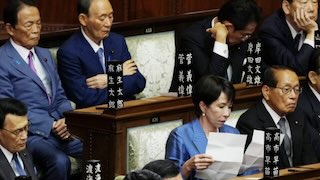TOKYO, Aug 27 (East Asia Forum) - In June 2023, the Japanese government published a revised version of the implementation plan for Prime Minister Fumio Kishida’s ‘new capitalism’ initiative.
The original 2022 version, titled ‘Grand Design and Action Plan for a New Form of Capitalism’, had outlined ambitious goals calling for increased investment in people, start-ups, green and digital transformations, science, technology and innovation.
Japanese insurance company starts online interview as employment test for university students in Tokyo, Japan, 1 June 2023 (Photo: Reuters/Yuki Kurose).
These investments were intended to both foster economic growth and solve social problems, such as the long-term stagnation of workers’ wages and climate change. The 2023 revision builds on the original plan by establishing a more concrete strategy to increase wages, improve productivity and achieve a virtuous cycle of sustainable growth and equitable income distribution.
To improve productivity, smooth labour mobility into growth sectors is crucial. The prominence of labour market reform as one of the main themes of the 2023 revision is a promising sign. The labour market reform plan aims to improve individuals’ ability to acquire new skills and knowledge by providing reskilling opportunities, promoting the shift to job-based employment and facilitating labour mobility into high-growth sectors.
Increasing productivity has long been a priority for Japan, but productivity growth has stubbornly remained at less than 1 per cent. There are signs that the tide may be turning. Japan’s aging and declining population, combined with a growing labour shortage and rapid technological innovation, are forcing many private companies to pursue more extensive investment in human resources. Many firms are reforming their personnel systems to improve the development and attraction of talented people, including foreigners.
Numerous reforms listed in the 2023 revision of the implementation plan, such as reform of the unemployment benefits system, have already begun to be discussed. Deliberations in the Diet on budgetary measures to expand investment in people will likely start later in 2023. These measures are expected to gradually increase the opportunities for reskilling and career transitions.
Still, other actions must be taken to achieve sustained wage growth. In particular, reskilling programs for non-regular workers and the correction of the gender wage gap are critical. The number of non-regular workers, which includes 50 per cent of female workers and 20 per cent of male workers, has been increasing since the 2000s. The government should more seriously engage in ‘active labour market policies’ like those used in Northern Europe, which entails providing a safety net for non-regular workers who wish to change jobs.
While labour market reform is one way to boost Japan’s gradually collapsing lifetime employment system, the Start-up Development Five-year Plan contained in the 2023 revision also aims to restore the dynamism of the economy. The policies contained in the plan have already been turned into a five-year roadmap for start-up development. Many people involved in Japan’s start-up ecosystem recognise that support for start-ups is at the centre of the growth strategy.
The plan also emphasises the importance of early revitalisation or smooth closing of businesses that are in trouble. This is because healthy competition with firm entry and exit is necessary for small and medium enterprises to increase productivity from a macro perspective. But the impact on the Japanese economy is uncertain, partly due to the lukewarm political attitude towards small and medium enterprises.
To increase household income, the 2023 revision includes the Doubling Asset-based Income Plan. This plan seeks to encourage the diversification of household financial assets away from their concentration in deposits and into investments. The goal is for households to benefit from the growth of Japanese companies, not only as employees but also as shareholders, thereby increasing their income.
Bold tax incentives have already been announced to encourage individuals to build long-term financial assets. But to truly realise these goals, Japan must improve the investment performance of asset management institutions and Japanese companies’ long-term corporate values.
The new growth strategy aims to encourage ambitious changes in Japan’s socio-economic system, especially in the labour market. The key to success lies in the Japanese government’s role in effectively mobilising the efforts of private companies, investors, financial institutions and individuals, while also reshaping the policy environment.
Due to current pressures including a persistent labour shortage, changes in global supply chains due to the escalation of geopolitical risk and changes in industrial structures, there is a growing desire to invest in Japan both at home and abroad. Prime Minister Fumio Kishida should take the lead to not only realise these plans but also to accelerate and intensify efforts for fundamental reform.















